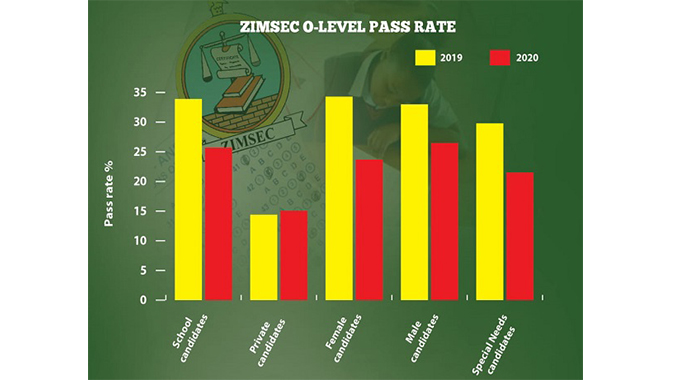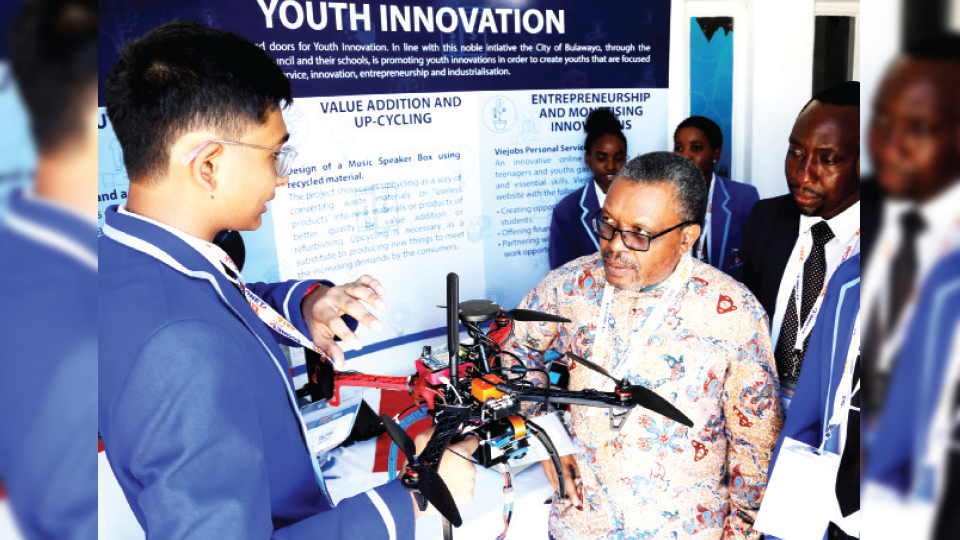O-level pass rate within range

Thandeka Moyo-Ndlovu, Chronicle Reporter
THE Zimbabwe School Examinations Council (Zimsec) has released the 2020 Ordinary Level results which show that the pass rate went down by 6,8 percent compared to 2019.
A total of 184 249 candidates wrote five or more subjects and 45 644 passed five or more subjects with a grade C or better giving an overall pass rate of 24,8 percent.
Statistics also show a significant drop in candidates who sat for the exams and authorities have attributed this to Covid-19-induced challenges.
The Covid-19 disruptions were also blamed for the drop in pass rate as pupils had very reduced learning period due to the lockdown regulations which forced Government to close schools for the greater part of last year.
Zimsec said heads of examination centres or schools started collecting results from their regional offices yesterday and the results have been accessible online since 10PM last night.
In a statement yesterday, Zimsec chairperson Professor Eddie Mwenje advised candidates to click on their respective region where they will be redirected to the portal on which they can access their results.
He said this portal will be open for five days only.
“The results will be accessible online to candidates who sat for the examinations as well as to authorised personnel through the Zimsec portal available as from 10PM today,” he said.

Professor Eddie Mwenje
Prof Mwenje said in 2020, 184 249 candidates wrote five or more subjects and 45 644 passed five or more subjects with a grade C or better giving an overall pass rate of 24,8 percent.
In 2019, 200 062 wrote five or more subjects and 63 215 obtained Grade C or better in five or more subjects and this translated to a 31,6 percent pass rate.
“A total of 264 099 candidates sat for the November 2020 Ordinary Level examination as compared to 296 464 candidates who sat for the same examinations in 2019. There was a decrease in candidature of 32 365, thus translating to a percentage decrease of 11 percent.”
Prof Mwenje said despite the decrease, the pass rate was still in range based on a historical analysis.
He said in analysing the pass rate, members of the public should also consider the devastating impact of the Covid-19 pandemic.
Prof Mwenje said it is also important to note that some countries that went into national lockdowns due to the pandemic also experienced a decrease in pass rates.
Statistics from Zimsec also show that 2020 pass rate for school candidates decreased by 8,2 percent.
School candidates who wrote five or more subjects were 168 272 and 43 244 obtained Grade C or better in five or more subjects, yielding a 25,7 percent pass rate in 2020.
In 2019, school candidates were 176 866 out of which 59 879 obtained Grade C or better in five or more subjects, yielding 33,9 percent pass rate.
“The total number of female candidates that entered for the November 2020 Ordinary Level examinations was 136 847. Out of this number 95 314 wrote five or more subjects with 22 581 passing five or more subjects, thus translating to a pass rate of 23,7 percent,” said Prof Mwenje.
The total number of female candidates that entered for the 2019 O-level examinations was 152 389. Out of this number 101 798 wrote five or more subjects and 34 952 passed five or more subjects yielding a 34,3 percent pass rate.
The pass rate for 2020 November female candidates decreased by 10,6 percent.
For males the pass rate decreased by 6,5 percent in 2020 compared to 2019.
A total of 127 152 males sat for the November exams and of these 88 935 wrote five or more subjects and 23 580 passed five or more subjects translating to a percentage pass rate of 26,5 percent.
In 2019 there were 144 075 male candidates who registered for the 0- level examinations. Of this number, 98 264 wrote five or more subjects and 32 388 passed five or more subjects yielding a pass rate of 33 percent.
Prof Mwenje said the pass rate for candidates with special needs also decreased by 8,3 percent.
“A total of 321 special needs candidates sat for a range of subjects from 1 to 12 in the November 2020 examinations. Of these 223 wrote 5 or more subjects and 48 passed five or more subjects yielding an overall percentage pass rate of 21,5 percent. The total number of special needs candidates who sat for the November 2019 0- level examinations was 332. Of these 215 registered for five or more subjects and 64 obtained five or more subjects yielding a percentage pass rate of 29,8. The 2020 pass rate for special needs candidates decreased by 8,3 percent,” he said.
Prof Mwenje called on all stakeholders of examinations to note that the 2020 school calendar was disrupted and that candidates wrote the examinations under lockdown in 2021.
“We are grateful to the Government for allowing the examinations to go on. Amidst the strict observance of the WHO suggested Covid-19 precautions to mitigate against the spread of the novel virus,examinations were written and marked without any major incidents or notable setbacks,” he added.
The Ministry of Primary and Secondary Education director of communications and advocacy Mr Taungana Ndoro said the ministry was implementing a catch-up strategy to help learners sail through the pandemic and pass their exams.

Mr Taungana Ndoro
“The number of candidates could have decreased because of the Covid-19 induced lockdown which forced schools to close and also made some candidates lose interest in school. The pupils also had reduced learning period which explains why there is a slight decline in the O-level pass rate,” said Mr Ndoro.
“Our core guidance and counselling teams at schools are encouraging and promoting education and schooling in all our districts. We have a robust catch-up strategy that is being used as a standard for enhanced teaching and learning,” he added.
Contacted for comment Zimbabwe Teachers Union acting chairperson Mr Godwin Taderera said lack of connectivity could have led to a decreased in the pass rate.
He said many girls fell pregnant during the lockdown while some were married off which could explain the decrease in both pass rate and candidature.
“We know that due to the lockdown which forced Government to close schools for the greater part of last year, pupils wrote the exams without preparing adequately. There was not enough data and gadgets for both learners and teachers which means only those who had access to extra lessons were ready for the exams,” said Mr Taderera.











Comments